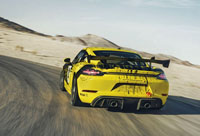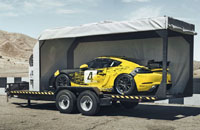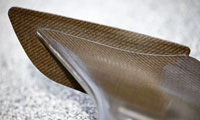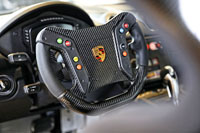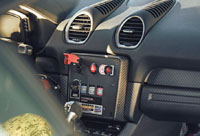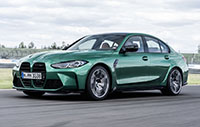
Say hello to Thing 1 and Thing 2. They’re not very pretty, but they can shoo, shoo, shoo, shoo!
Ok, Dr. Suess we’re not, but you’ve got to give us some credit for having a little fun with BMW’s two new cartoonish cars. The 2021 M3 sports sedan and M4 sport coupe were unveiled Tuesday, September 22, after which the world’s performance car netizens let their feelings be known in (mostly) unsatisfied ways. Artist’s renderings soon popped up showing how BMW should have designed the oft-criticized duo, which certainly isn’t the best of initial signs.
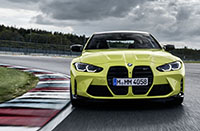
Of course, plenty of pandering professional pundits were merely calling the new M cars “bold” or “dramatic”, which probably shows more kindness than the polarizing cars deserve, but to each his or her own, as the saying goes, so whether we like BMW’s new styling approach or not, we can at least revel in their engineering prowess.
Certainly, BMW is reaching back into its storied history for inspiration, possibly pulling new M3 and M4 frontal design cues from the original mid-‘60s 2000 C and 2000 CS sport coupes that eventually became the much-loved and highly collectible 1968 to 1975 E9 CS series of coupes, not to mention much earlier 1930s and ‘40s-era 300 series cars that wore then-typical tall and narrow radiator grilles. Either way the Bavarian automaker has the automotive world abuzz, which isn’t such a bad thing on its own.
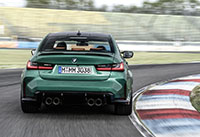
The new M3 (G80) and M4 (G82) are the products of BMW design head Domagoj Dukec, who made sure everything rearward of the massive vertical dual-kidney grille is sleek and acceptably stylish, not dissimilar to the F80, F82 and F83 compact M cars that came before. Even these models were more aggressive than any previous M3 (the M4 only came into existence with the F models), featuring subtler bodywork that more easily slid past the radar.
Now the new M3 and M4 look as fast as they are. Both are capable of sprinting from zero to 100 km/h in just 4.2 seconds in their most basic “core” trims, plus 80 to 120 km/h in only 4.1 seconds when their standard six-speed manual transmission is placed in fourth gear, and on to a top speed of 250 km/h unless upgraded with an M Driver’s Package that pushes their terminal velocity to 290 km/h.
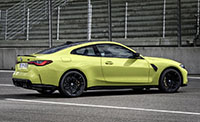
As is now part of the M business model, upgraded Competition models can be had that chop the M3 and M4’s zero to 100 km/h time by 0.3 seconds to a mere 3.9 seconds, while the two cars’ 80 to 120 km/h passing capability gets axed by a whopping 1.5 seconds resulting in just 2.6 seconds to accomplish the feat, or so says BMWblog.com.
BMW’s 3.0-litre TwinPower Turbo inline six-cylinder engine, now internally dubbed S58, has been upgraded for its new application, with two mono-scroll turbochargers boasting quick-reacting electronically-controlled wastegates, plus ultra-efficient air-to-water intercooling. Like the old S55 twin-turbo I-6, the new engine is built upon BMW’s B58 engine architecture introduced five years ago.
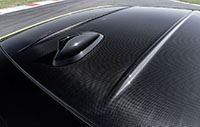
The entry-level engine used in M3/M4 core models produces 48 additional horsepower over its predecessor for a maximum of 473 hp at 6,250 rpm, whereas the even more potent Competition version puts out 59 more hp for a max of 503, also at 6,250 rpm. Redline is a lofty 7,200 rpm, impressive unless comparing it to the 2007-2013 E90/E92/E93 M3 that stuffed an absolutely brilliant V8 behind its subtler grille, which easily wound up to 8,400 rpm and delivered an auditory sensation second to few.
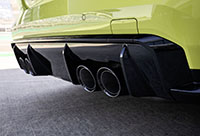
The two M models’ quad of 100-millimetre diameter tailpipes should blat out an enticing soundtrack nonetheless, thanks in part to electrically opening/closing flaps controlled by an M Sound button. This lets drivers reduce exterior sound levels when driving through quiet neighbourhoods or merely wanting a more refined experience, or alternatively adding more sound when pushing the envelope, which requires opting for SPORT or SPORT+ modes.
Wire-arc sprayed cylinder liners lower friction and weight for a more free-revving engine, while a lightweight forged crankshaft reduces rotating mass further. Both are attached to a rigid closed-deck engine block, while the engine’s cylinder head boasts a 3D-printed core to provide better coolant flow-through along with less weight.
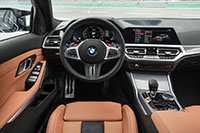
The core models’ torque rating is identical to the previous M3 and M4 at 406 lb-ft between 2,650 and 6,130 rpm, with Competition cars getting 73 lb-ft more for a new maximum of 479 lb-ft between 2,750 and 5,500 rpm.
In place of the core model’s standard six-speed manual gearbox, which features a rev-matching Gear Shift Assistant that makes any driver sound like a pro when downshifting, Competition model buyers need to accept BMW’s eight-speed M Steptronic automatic with Drivelogic. Drivelogic features three drive settings including “ROAD”, “SPORT” and “TRACK”, the latter only available after selecting the cars’ M Drive Professional setting. The autobox can be shifted with steering wheel paddles, which is par for the course in this class, but take note that it will remain in its chosen gear without automatically upshifting when in manual mode.
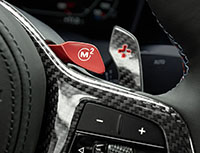
The M3 and M4 once again arrive standard with a rear-wheel drivetrain, although now new Competition trim can also be had with BMW’s xDrive all-wheel drive. The system is rear-wheel biased under normal conditions to promote BMW’s classic driving feel, but an Active M Differential apportions some of that torque to the front wheels when those in the rear experience slip.
When the aforementioned Sport mode is selected, however, additional power will be directed to the wheels in back for a more enjoyable driving experience, even so much that the rear end of the car will be able to slip sideways for some tail-wagging fun. This said, driving experts can shut off traction control entirely in order to utilize oversteer to their advantage. The M Traction Control system controls it all, with 10 different settings from near total intervention to wholly unchecked.
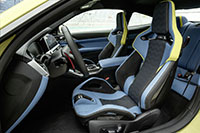
Considering the eyeball-pulling power of the new M3 and M4’s front grille design, you may not have noticed the longer wheels that extends 45 millimetres past the outgoing car’s axle separation, while it also includes slightly wider track for what should resulting in better ultimate road manners. A beautiful carbon fibre reinforced plastic (CFRP) roof panel is now standard, helping to lower the car’s overall centre of gravity. Lastly, the new M3 and M4 are weight-balanced front to rear ideally at 50/50.
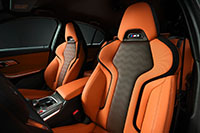
If you think all good things happen in threes (or was that bad things?), the M3 and M4’s transmission isn’t the only component with preset driving settings. The cars’ chassis also gets three preset settings to optimize varying road conditions through an electronically-controlled Adaptive M suspension that features Comfort, Sport and Sport Plus modes. Together with a progressively stiffening setup, the M Servotronic steering system increases sharpness for better response, while 275/40ZR18 front and 285/35 ZR19 rear performance tires benefit core and Competition model handling with their rear-wheel drivetrains. Alternatively, all-wheel drive Competition trims get a set of 275/35ZR19s up front and 285/30ZR20s in back.
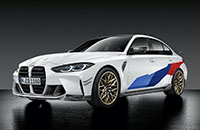
Braking performance has been enhanced to mirror the two M cars’ engine and suspension improvements too, with new six-piston fixed-caliper binders clamping down on 380 mm rotors in front and single-piston floating calipers biting into 370 mm discs at the rear. The brand’s M Carbon ceramic brakes are also available, featuring bigger 400 mm front and 380 mm rear rotors for even shorter stopping distances and reduced fade, enhanced thermal stability, and longer overall life. They’re easy to differentiate thanks to gold-painted calipers in place of standard blue or optional black or red. An electric “integrated braking” actuator helps improve braking response further, no matter which brakes are chosen.
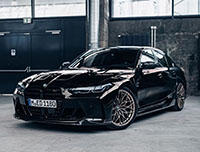
Notably, the M Carbon ceramic brakes are available as a standalone option or as part of the M Race Track Package that also adds light-alloy wheels and lightweight M Carbon front seats. The M Drive Professional upgrade package, which comes standard on Competition models and is optional with core cars, features an M Drift Analyzer that records oversteer as well as opposite lock events, including the timed duration, line and drift angle. Your personal results are rated from one to five stars.
BMW Canada is promising 2021 M3 and M4 deliveries to start next spring, with pricing set to $84,300 for the sedan and $85,100 for the coupe (plus freight and fees), while pricing and details for the 2021 M4 Cabriolet should arrive sometime within now and then. Competition trim seems to be excellent value at just $4,000 extra, so therefore we think it will be most buyers’ first choice.
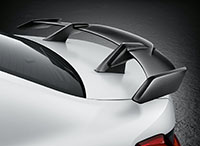
Just a final thought before signing off, anyone wanting the performance of the new M3 or M4 yet uncomfortable with the attention-getting grille might want to check the cars out in all-black trim. Sure it’ll be a scratch, dirt and dust magnet, but a photo of one that emerged as part of BMW’s simultaneous Performance Parts catalogue launch shows the four-door version in a much more appealing light. The digital catalogue promoted a Darth Sith-like red and black version too, which was even more over the top than the dayglow yellow and soylent green launch models, as were the counter table-sized rear wing and triangular quad of exhaust pipes. A white M4 wearing traditional M-striped BMW livery was pretty good looking though, so it appears some of the grille’s initial wow-factor can be downplayed with a subtler colour choice.
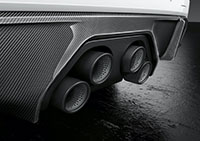
Then again, if a new M3 or M4 won’t work for you stylistically, consider snatching up a 2020 model while they’re still available. We’re showing up to $2,000 in additional manufacturer incentives on 2020 models as this story was written, which is a good starting point when sitting down to negotiate. On that note, make sure to check out all of CarCostCanada’s money-saving information, including available manufacturer financing and leasing rates, manufacturer rebates, and even dealer invoice pricing that may save you thousands. Also, remember to download the free CarCostCanada app from Google Play Store or the Apple Store.
BMW Today – Episode 25: World premiere BMW M3 & M4 (13:15):
Story credit: Trevor Hofmann
Photo credits: BMW


